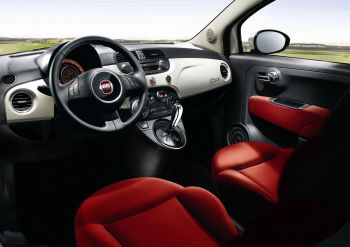 |
|
The
dashboard specifications set by Fiat were
particularly challenging. To keep a high
level of aesthetic surface appeal and avoid
visual defects, Fiat specified a
mono-material solution for the 500ís major
interior parts. |
|
|
|
High
performance materials from Borealis, a leading provider
of innovative value creating plastics solutions, have
helped to achieve a visually, highly differentiated
small car for drivers, the Fiat 500.
The 2008 Car
of the Year award winner uses polypropylene-based Daplen
thermoplastic olefins (TPO) from Borealis on its bumpers and
dashboard to achieve the superior aesthetics and excellent
performance of its parts that give the Fiat 500 the edge in
the small car market.
Italyís leading
car manufacturer Fiat set visual appeal as one of the top
priorities for its new 500 model for both interior and
exterior components. To successfully realise Fiat's
eye-catching concept of a large bumper with outstanding
scratch resistance, a Class A smooth surface finish and good
paintability, Borealis worked closely with parts moulder
Ersi (Poland) and Fiat to find the ideal material solution.
The challenge was met with Daplen EE103AE, a high melt flow
rate (MFR) TPO with excellent scratch resistance and the
ability to achieve uniform thickness over a large surface
area. Its low thermal expansion over a broad temperature
range ensures consistent high quality for large, moulded
parts and precise fitting to other exterior panels, further
enhancing the overall visual impression. The dashboard
specifications set by Fiat were particularly challenging. To
keep a high level of aesthetic surface appeal and avoid
visual defects, Fiat specified a mono-material solution for
the 500ís major interior parts.
Poland-based
parts moulder Plastal chose Daplen EE103AE to meet
requirements for excellent scratch resistance and low gloss,
while also guaranteeing a consistent finish and high quality
parts integration through the materialís high dimensional
stability and low thermal expansion. In addition, the
excellent impact/stiffness ratio offered by Daplen EE103AE
enhances vehicle safety.
Both bumper and dashboard benefit from the lightweight of
polypropylene without compromising on performance of parts.
Lighter weight components can contribute towards lower
overall vehicle weight, resulting in reduced fuel
consumption and less CO2 emissions. The Fiat 500 falls
within the EU CO2 emission standard of 120g/km set to take
effect from 2012.
"Vehicle manufacturers are continuously seeking ways to
sharpen the competitive edge of their brands," comments
Franz Zangerl, Manager Business Development Automotive at
Borealis. "The use of Daplen materials in both interior and
exterior applications on the Fiat 500 has helped Fiat to
realise its ambitions for a small vehicle with cutting-edge
design features that will boost consumer perceptions of
Fiat's image and quality. The success of our materials in
these components opens up exciting new opportunities for the
use of polypropylene-based compounds in new automotive
applications."
|